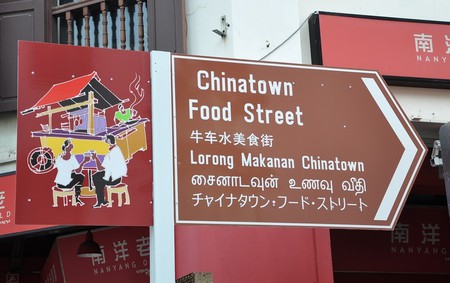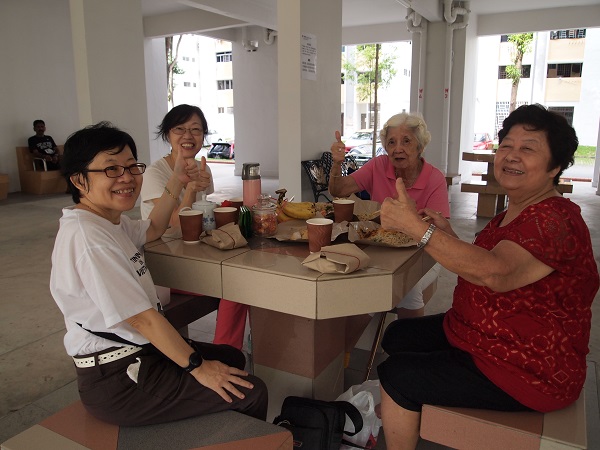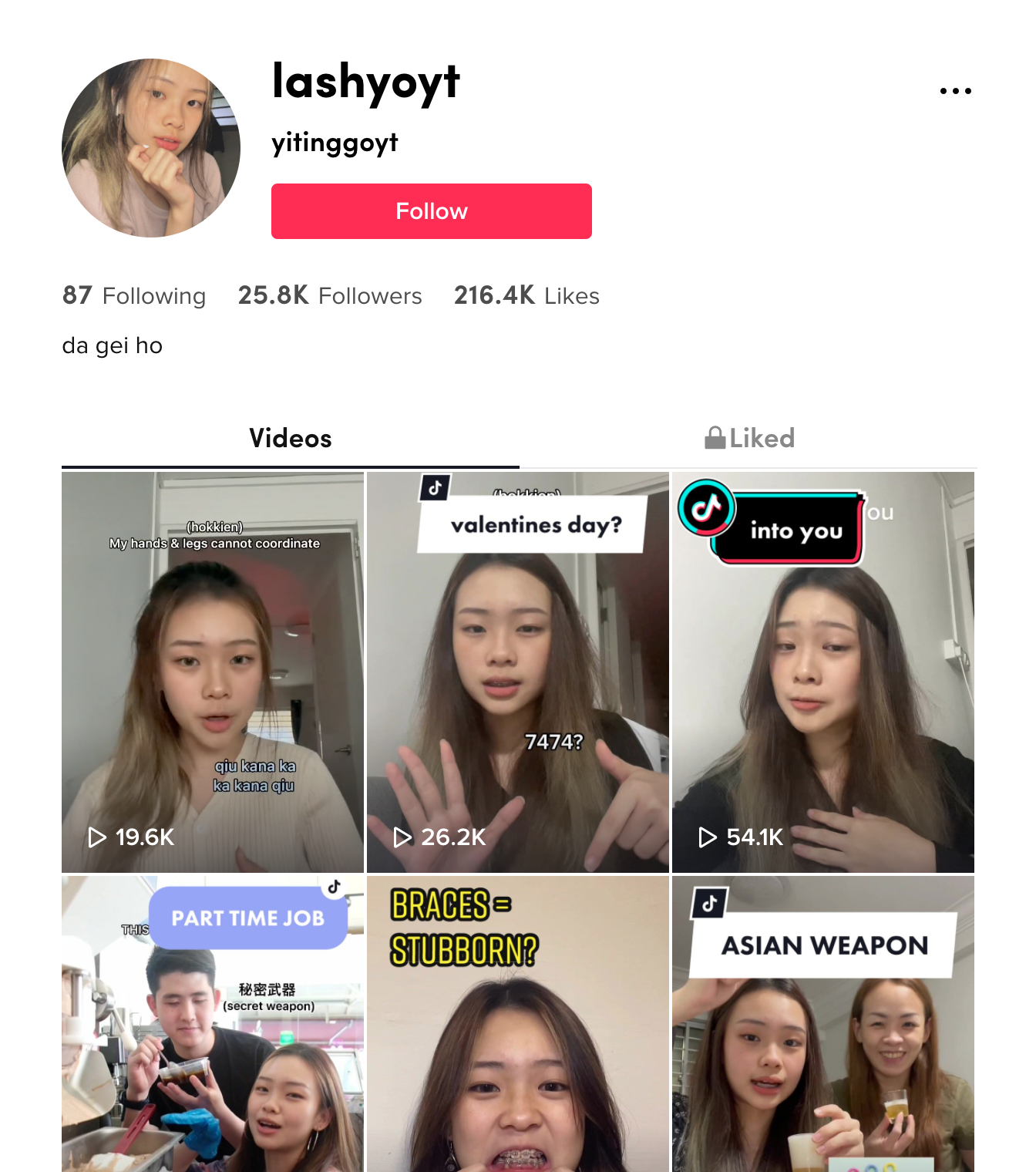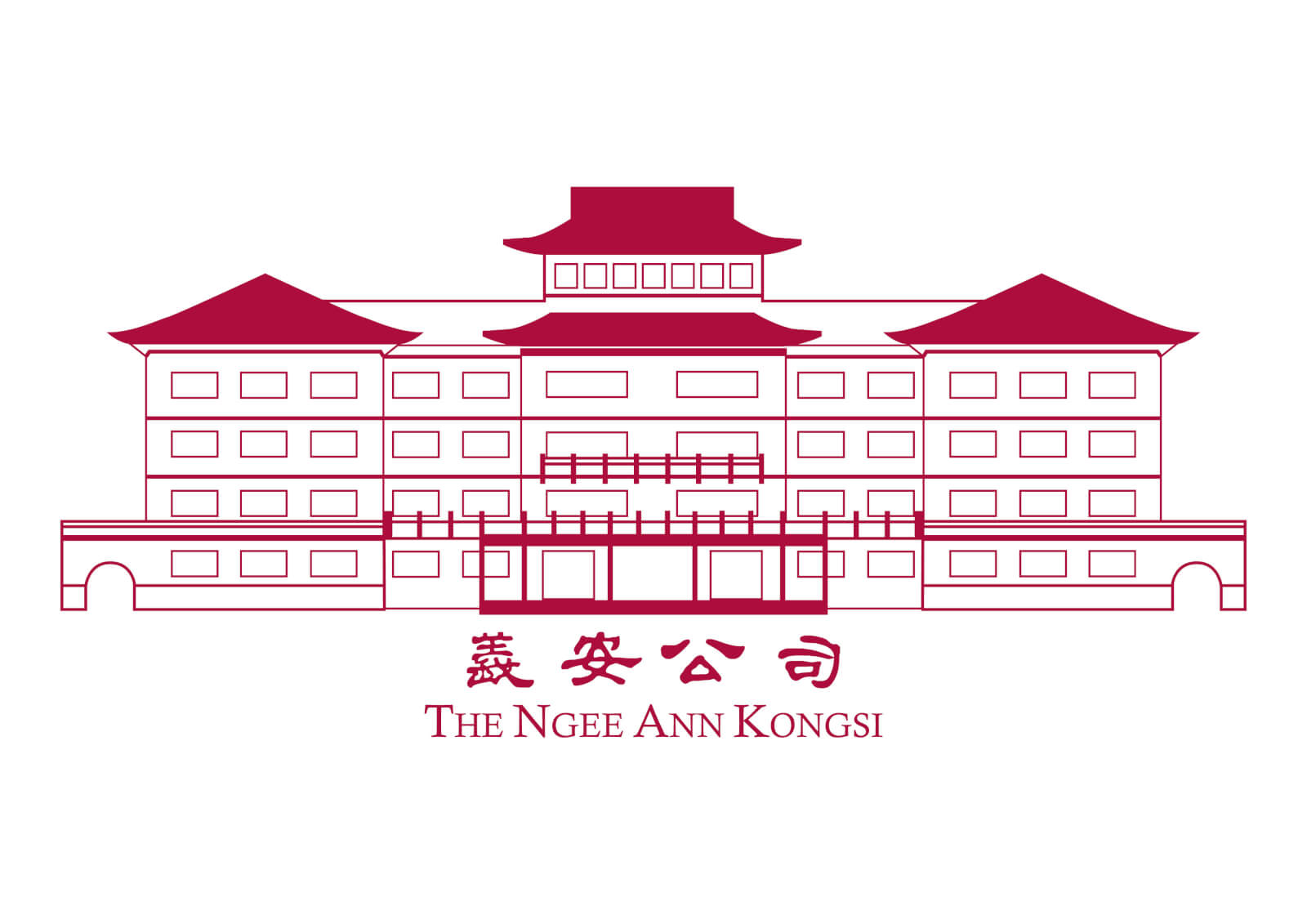Singaporean Youths and their Chinese Dialects and Cultures
Jamie Mah explores the significance of Chinese dialects to Singapore’s Chinese roots and how youths view their Chinese dialects.
The Woodsman is a graphic novel by renowned illustrator, ELvin Ching. Photo courtesy of Epigram Books.
BY
Jamie Mah
Editor
Hype Issue #53
Published on
Sep 7, 2021
Singapore: a multi-racial melting pot of different cultures and by extension, languages. With four national languages (English, Chinese, Malay and Tamil), Singaporeans are used to speaking in sentences littered with phrases and words of multiple languages.
However, some of our other languages, namely, our Chinese dialects, are slowly becoming more obscure, particularly among the younger generations due to the lack of use and interest in learning them.

A street sign in English, Chinese, Malay, Tamil and Japanese in Chinatown. Photo taken from Culture Trip.
Singapore’s Chinese dialects mainly consist of Teochew, Hokkien, Cantonese, Hakka and Hainanese. Hokkien is perhaps the most recognised dialect as Singaporeans fall back on its popular phrases and swear words with familiar ease, leading to Hokkien having a reputation as a rather ‘vulgar’ dialect.
Some common Hokkien phrases include food, such as rice dumplings, known as ba zhang in Hokkien. Other phrases include le zuo simi, which means “what are you doing?” in Hokkien.
Nowadays, dialect is more commonly heard in short phrases amongst youths, while the actual language is only spoken among older generations when they gather with friends in coffee shops or void decks.
With the culture of dialects fading fast due to the lack of proficiency among youths, what does this mean for the future generations of Singaporean Chinese?

Many senior citizens are unable to speak English, and rely on either Mandarin or their dialects to communicate with others. Photo taken from TOUCH Community Services.
According to the General Household Survey conducted by the Department of Statistics in 2015, a measly 12.6 per cent of households primarily speak dialect in their homes, a small number as compared to the 15.8 per cent in 2010 and the 18.2 per cent in 2005. Not to mention, among the 12.6 per cent of Singaporeans speaking dialect at home, only 3.4 per cent of them were aged between 15 to 29 years old.
Nowadays, English is the most commonly spoken language in Singaporean households. A survey conducted on households showed that 36.9 per cent of residents above five years old used English more often at home, against the 34.9 per cent who use Mandarin more.
Origin of Dialects in Singapore
Dialects have had a long history in Singapore, but were pushed to the background when Singapore began prioritising Mandarin and English under the leadership of our first Prime Minister and Founding Father, Lee Kuan Yew. He believed that ‘the knowledge of dialects undermined the mastery of key languages.’

Orchard street in Singapore during the 1970s. Photo taken from Mustsharenews.
Singapore used to be a fishing port filled with people from all corners of the world, and Hokkien was the first language of around 40 per cent of the population in the 1970s. Around 75 per cent of the population were of Chinese ethnicity, and in 1979, the ‘Speak Mandarin’ campaign was launched to encourage citizens to speak their mother tongue.
Other than Mandarin, English was pushed to be one of our main languages as it was the language used for global trade and commerce.

Chinese dialects are being spoken less in Singapore. Photo taken from LearnDialect.sg Instagram page.
“As compared to the past, Chinese dialects are not spoken as frequently today. However, this is understandable as the languages used in Singapore are English and our respective Mother Tongues,” says LearnDialect.sg, a dialect learning centre in Singapore.
Singapore’s Chinese inhabitants mostly came from the southern provinces of China, such as Guangdong and Fujian, where our dialects of Hokkien, Teochew, Cantonese and Hakka dialects came from.
The dialects we speak in Singapore now hold different nuances in pronunciation as compared to those spoken in China, Hong Kong and Taiwan, despite holding the same name. This is an effect of the ‘Chinese diaspora’ in Singapore.
Chinese diaspora is defined by Professor Wang Gungwu, who has studied Chinese diaspora significantly, as “those of Chinese descent who have made their homes and settled as nationals in a variety of countries, specifically in Southeast Asia.”
Chinese forefathers brought their cultures and traditions to the different countries that they migrated to, and these Chinese identities began to change to adapt to the ways of the country they were in. In Singapore, the Chinese identity is less prominent now than ever before.
Dialect in Singapore today
However, in recent years, our Chinese dialects have begun to become more obscure than common. It is a common scene when a grandparent is unable to communicate with their young grandchildren due to the language barrier.
“I do feel left out especially when it’s my older cousins speaking in dialect,” says Shayne Chong, 19, a Mass Communication student at Ngee Ann Polytechnic. “Because we are of the same generation, kind of, and I want to be able to know what they are talking about and I don’t want them to treat me as if I’m a kid and not get what they are talking about.”
The younger generation has taken to learning English and Mandarin before their own cultural dialects, with many not learning their dialects until well into their teenage years, and some never showing interest in the languages.
“English already works as a universal language, and Mandarin is widely understood as it is a common mother tongue,” says a participant in a survey done by Hype Magazine when asked if they felt that it is important for youths to learn their Chinese dialects. “While dialect has its place as a way to feel more connected to culture and traditions, I do not feel it is necessarily [a] language that is significant to appreciating and understanding said culture and traditions.”
Of the statistics from our survey, it was found that 55 per cent of respondents could not speak or understand their dialect, while 10 per cent of the respondents were able to understand their dialect but were unable to speak them. Majority of the respondents, a significant 87.5 per cent of them, learned to speak their dialect through listening and speaking with their family.
“Hokkien was used in adult conversations daily, I picked it up by listening… Occasionally, when I [visited] my maternal family, I would hear Teochew and try to pick it up as well,” said Toh Yee Ling, 22, a real estate student at the National University of Singapore.
While there are still a significant number of youths who know their dialect, there are still plenty who do not know their dialect and even show no interest in learning it.
“The emphasis should be spent on globalised concepts such as sciences or universal languages such as English,” says another youth participant from our survey.
On the other hand, there are many youths who are passionate about reviving the culture of our dialects in Singapore. Some of these youths have social media pages that hope to inspire and teach others about their dialects.
Resources for learning dialect in Singapore
For example, the Facebook page ‘Writing in Hokkien’ has amassed a following of nearly 6,000 people, and is run by Lee Xuan Jin, 20. He regularly posts flashcards of Hokkien phrases and updates on dialect-related topics in Singapore.
There is also an Instagram account called ‘hakka_scribbles’ run by Sung Chang Da, where he posts flashcards of Hakka words and phrases to teach people the language. Further proving that there are youths still passionate about dialects, there is also a TikTok account run by Yi Ting, 21, a university student in Singapore, where she teaches her audience on Hokkien phrases through fun and humorous videos.

Yi Ting’s TikTok account teaches youths Hokkien through her funny content. Photo taken from @lashyoyt on TikTok.
There are also places in Singapore that offer lessons for those interested in learning dialects beyond educational social media pages, such as at community centres or specific dialect clan associations, such as the Singapore Hokkien Huay Kuan or the Ngee Ann Kongsi organisation.
There are also places in Singapore that offer lessons for those interested in learning dialects beyond educational social media pages, such as at community centres or specific dialect clan associations, such as the Singapore Hokkien Huay Kuan or the Ngee Ann Kongsi organisation.
There are also places in Singapore that offer lessons for those interested in learning dialects beyond educational social media pages, such as at community centres or specific dialect clan associations, such as the Singapore Hokkien Huay Kuan or the Ngee Ann Kongsi organisation.

The Ngee Ann Kongsi focuses on preserving Teochew heritage. Photo taken from The Ngee Ann Kongsi.
The Ngee Ann Kongsi is a non-profit Teochew philanthropic organisation focused on educational, cultural and charitable activities in Singapore. They also place a deep emphasis on preserving the Teochew heritage.
The Singapore Hokkien Huay Kuan has always made it its priority to preserve and promote Chinese language and Chinese culture. The Huay Kuan also focuses on education and social services.
Clan associations have a long history in Singapore, dating back to 1985 when the Singapore Federation of Chinese Clan Associations was registered.
They aimed to “revitalise the roles played by Singapore’s Chinese clan associations, to promote Chinese language, values and traditions, as well as to organise and support educational, cultural and community activities. It also aims to promote social cohesion and harmony among all races and new immigrants in Singapore.”
One organisation that offers dialect lessons in Singapore is LearnDialect.sg. Run by Ski Yeo and Eugene Lee, they are passionate about helping others in Singapore learn their native dialects and understanding the languages.

A dialect class at LearnDialect.sg before the Covid-19 pandemic struck. Photo courtesy of LearnDialect.sg.
“At LearnDialect.sg, we centre our efforts [around reaching] out to the younger generations to learn Chinese dialects. In that way, we hope that they can better appreciate their cultural roots or have more meaningful conversations with their grandparents,” says LearnDialect.sg.
They offer online lessons for Hokkien, Cantonese and Teochew for a fee. The lessons are taught in English for students to easily understand the lesson, and even encourage members of the older generation to facilitate and teach the younger generation what they know of the language.
Importance of learning dialect
Given our history with dialect in Singapore, it is important to our cultural roots that we continue to learn our dialects and pass them on to our future generations so that we may preserve this important cultural heritage.
“I believe it is important to uphold cultures and heritage since it was a way of the past and it actually presents [the] authenticity of how our people have been living since the past,” says Ms Toh.
“I think it is important in certain ways because it helps us acknowledge our heritage and understand the older generations better especially when [the] majority of them like [our] grandparents may only be able to speak in dialect,” Shayne agrees.
There are many resources one can make use of when looking to learn dialect in Singapore, and while it does not seem likely that dialect learning will be incorporated into our school’s curriculum, there are steps our government can take to encourage more youths to take pride in their culture and learn their dialect. One such way is by “increasing exposure to Chinese dialects through different media platforms.”
Youths have also begun taking the first steps and learning dialect once they realise the importance of it.
“We noticed that many youths are keen to learn Chinese dialects, but of course, these are youths who are already interested in Chinese dialects,” says LearnDialect.sg. “At LearnDialect.sg, one of the challenges that we face is to generate enough interest for the younger generation to learn Chinese dialects, versus, for example, a seemingly cooler language such as Korean or Japanese, or any other non-language related activities (e.g., kickboxing, cooking).”
Ultimately, it is up to each individual if they have enough interest in learning the language and recognise the importance of keeping in touch with our cultural roots.
Singapore’s Chinese dialects play an integral role in preserving our culture and remaining in touch with the roots of our forefathers, and it would be a shame for yet another piece of our heritage to simply fade away.
Would you be interested in learning more about your Chinese dialect?

Very nice post. I just stumbled upon your blog and wanted to say that I’ve really enjoyed browsing your blog posts. In any case I’ll be subscribing to your feed and I hope you write again soon!
Your point of view caught my eye and was very interesting. Thanks. I have a question for you.
I am an investor of gate io, I have consulted a lot of information, I hope to upgrade my investment strategy with a new model. Your article creation ideas have given me a lot of inspiration, but I still have some doubts. I wonder if you can help me? Thanks.
At the beginning, I was still puzzled. Since I read your article, I have been very impressed. It has provided a lot of innovative ideas for my thesis related to gate.io. Thank u. But I still have some doubts, can you help me? Thanks.
best blog commenting software
eaxhphokm nqbfm kwjhoam xtbr kjuevowffjbgrdx
… [Trackback]
[…] Read More Information here on that Topic: hypesingapore.com/index.php/2021/09/06/singaporean-youths-and-their-chinese-dialects-and-cultures/ […]
… [Trackback]
[…] Find More here to that Topic: hypesingapore.com/index.php/2021/09/06/singaporean-youths-and-their-chinese-dialects-and-cultures/ […]
… [Trackback]
[…] Information on that Topic: hypesingapore.com/index.php/2021/09/06/singaporean-youths-and-their-chinese-dialects-and-cultures/ […]
… [Trackback]
[…] Find More to that Topic: hypesingapore.com/index.php/2021/09/06/singaporean-youths-and-their-chinese-dialects-and-cultures/ […]
… [Trackback]
[…] Read More Info here on that Topic: hypesingapore.com/index.php/2021/09/06/singaporean-youths-and-their-chinese-dialects-and-cultures/ […]
… [Trackback]
[…] Information on that Topic: hypesingapore.com/index.php/2021/09/06/singaporean-youths-and-their-chinese-dialects-and-cultures/ […]
… [Trackback]
[…] Info on that Topic: hypesingapore.com/index.php/2021/09/06/singaporean-youths-and-their-chinese-dialects-and-cultures/ […]
… [Trackback]
[…] Information on that Topic: hypesingapore.com/index.php/2021/09/06/singaporean-youths-and-their-chinese-dialects-and-cultures/ […]
… [Trackback]
[…] Read More Information here to that Topic: hypesingapore.com/index.php/2021/09/06/singaporean-youths-and-their-chinese-dialects-and-cultures/ […]
… [Trackback]
[…] Info to that Topic: hypesingapore.com/index.php/2021/09/06/singaporean-youths-and-their-chinese-dialects-and-cultures/ […]
… [Trackback]
[…] Read More here to that Topic: hypesingapore.com/index.php/2021/09/06/singaporean-youths-and-their-chinese-dialects-and-cultures/ […]
<a href=”https://www.jeetersjuicecart.com/” rel=”dofollow”>This is amazing work thanks </a>
<a href=”https://www.jeetersjuicecart.com/product-category/jeeter-juice-carts/”rel=”dofollow”>I am glad to have come across this </a>
<a href=”https://www.jeetersjuicecart.com/about-us/” rel=”dofollow”>well detailed </a>
<a href=”https://www.jeetersjuicecart.com/jeeter-juice-shop/”>This is amazing work thanks </a>
<a href=”https://www.jeetersjuicecart.com/jeeter-apparel/” rel=”dofollow”>let me know if i can come through </a>
<a href=”https://www.jeetersjuicecart.com/product-category/infused/” rel=”dofollow” >jeeter</a>
<a href=”https://www.jeetersjuicecart.com/product-category/jeeter-baby-cannon/” rel=”dofollow”>juice</a> <a href=”https://www.jeetersjuicecart.com/product/jeeter-juice-gelato/” rel=”dofollow”>.</a>
<a href =”https://www.jeetersjuicecart.com/how-much-is-a-jeeter-vape/”>.</a> <a href =”https://www.jeetersjuicecart.com/jeeter-live-resin/”rel=dofollow”>.</a>
… [Trackback]
[…] Find More Information here to that Topic: hypesingapore.com/index.php/2021/09/06/singaporean-youths-and-their-chinese-dialects-and-cultures/ […]
… [Trackback]
[…] Read More Info here on that Topic: hypesingapore.com/index.php/2021/09/06/singaporean-youths-and-their-chinese-dialects-and-cultures/ […]
Jeeter juice carts are an excellent choice for anyone looking to provide their guests with a
healthy and tasty beverage option with their convenient size, they
can easily be trnsported https://jeeterjuice.company.site/
Polkadot Chocolate Store, where we blend expertise in shrooms with the art of
chocolate making. Our unique mushroom chocolate bars are renowned for their
quality and intricate flavor https://polkadotchocolatebars.company.site/
… [Trackback]
[…] Find More Information here to that Topic: hypesingapore.com/index.php/2021/09/06/singaporean-youths-and-their-chinese-dialects-and-cultures/ […]
japanese
jazz instrumental
water fountain and birds chirping
research products with and without prescription worldwide. Our shipping and delivery is 100% safe,fast and convenient. We are ready to sell small and large quantities supplies of our product with or without prescription.WORLDWIDE DELIVERY..
Email;lukaspharmacy@gmail.com
WEBSITE;https://lukaspharmacy.com/
<a href=”https://lukaspharmacy.com/product/buy-ritalin-online/”>buy-ritalin-online</a>
<a href=”https://lukaspharmacy.com/product/keto-bullet”>keto-bullet</a>
<a href=”https://lukaspharmacy.com/product/buy-zomorph-online/”>buy-zomorph-online</a>
<a href=”https://lukaspharmacy.com/product/buy-dilaudid-online/”>buy-dilaudid-online</a>
<a href=”https://lukaspharmacy.com/product/buy-dihydrocodeine-online/”>buy-dihydrocodeine-online</a>
<a href=”https://lukaspharmacy.com/product/buy-demerol-online/”>buy-demerol-online</a>
<a href=”https://lukaspharmacy.com/product/buy-codeine-online/”>buy-codeine-online</a>
<a href=”https://lukaspharmacy.com/product/buy-duromine-online/”>buy-duromine-online</a>
<a href=”https://acheterritalin.com/produit/acheter-ritalin-en-ligne/”>acheter-ritalin-en-ligne</a>
<a href=”https://acheterritalin.com/produit/acheter-oramorph-en-ligne/”>acheter-oramorph-en-ligne</a>
<a href=”https://acheterritalin.com/produit/acheter-oramorph-en-ligne/”>acheter-oramorph-en-ligne</a>
<a href=”https://acheterritalin.com/produit/injection-de-citrate-de-fentanyl/”>injection-de-citrate-de-fentanyl</a>
<a href=”https://acheterritalin.com/produit/kit-de-test-nembutal/”>kit-de-test-nembutal</a>
<a href=”https://acheterritalin.com/produit/acheter-nembutal-en-ligne/”>acheter-nembutal-en-ligne</a>
<a href=”https://acheterritalin.com/produit/acheter-le-film-…one-2mg-en-ligne/”>acheter-le-film-…one-2mg-en-ligne</a>
<a href=”https://acheterritalin.com/produit/acheter-oxycodone-30mg-kvk-tech/”>acheter-oxycodone-30mg-kvk-tech</a>
<a href=”https://acheterritalin.com/produit/acheter-dilaudid…jection-en-ligne/”>acheter-dilaudid…jection-en-ligne</a>
<a href=”https://acheterritalin.com/produit/acheter-blu-xanax-en-ligne/”>acheter-blu-xanax-en-ligne</a>
<a href=”https://acheterritalin.com/produit/acheter-focalin-en-ligne/”>acheter-focalin-en-ligne</a>
<a href=”https://acquistaritalin.com/prodotto/acquista-demerol-online/”>acquista-demerol-online</a>
<a href=”https://acquistaritalin.com/prodotto/acquista-oxicodone-online/”>acquista-roxicodone-online</a>
<a href=”https://acquistaritalin.com/prodotto/acquista-a-215-ossicodone-actavis/”>acquista-a-215-ossicodone-actavis</a>
<a href=”https://acquistaritalin.com/prodotto/acquista-morfina-solfato-online/”>acquista-morfina-solfato-online</a>
<a href=”https://acquistaritalin.com/prodotto/opana-oxymorphone-hcl-40mg/”>opana-oxymorphone-hcl-40mg</a>
<a href=”https://acquistaritalin.com/prodotto/acquista-film-suboxone-8mg-online/”>acquista-film-suboxone-8mg-online</a>
<a href=”https://acquistaritalin.com/prodotto/acquista-oxycontin-online/”>acquista-oxycontin-online</a>
<a href=”https://acquistaritalin.com/prodotto/acquista-levitra-20mg-online/”>acquista-levitra-20mg-online</a>
<a href=”https://acquistaritalin.com/prodotto/acquista-valium-online/”>acquista-valium-online</a>
<a href=”https://acquistaritalin.com/prodotto/xanax-bars-2mg-alprazolam/”>xanax-bars-2mg-alprazolam</a>
<a href=”https://acquistaritalin.com/prodotto/modafinil-200mg-modavigil/”>modafinil-200mg-modavigil</a>
<a href=”https://acquistaritalin.com/prodotto/acquista-ritalin-online/”>acquista-ritalin-online</a>
<a href=”https://acquistaritalin.com/prodotto/acquista-vyvanse-online/”>acquista-vyvanse-online</a>
outdoor cafe
Can you be more specific about the content of your article? After reading it, I still have some doubts. Hope you can help me. https://www.binance.info/ro/join?ref=P9L9FQKY
outdoor coffee
This is a very nice blog and I learned more knowledge from reading this post. Thanks for sharing this informative post
<a href=”https://www.luminousprinting.com.sg/category/t-shirts”>#design t shirts</a>
Fryd Carts are a popular brand of Live Resin carts that have been making waves in the cannabis
community. These carts are known for their high quality, potency, and delicious flavors that
are unmatched by other brands. https://frydcarts.company.site/
Polkadot Chocolate – Experience luxury with our unique flavors like Samoas, Apple Pie, and Blue Acai. Premium mushroom chocolate bars
https://polkadotchocolatedepot.com/
Welcome to Polkadot Chocolate, your ultimate destination for mushroom chocolate bars with a twist! Our unique and delicious flavors are designed to satisfy every chocolate lover’s palate https://polkadotchocolatebars.company.site/
Fryd Carts have taken the vaping world by storm, offering cannabis enthusiasts
a premium experience like no other. Known for their top-tier quality, potent
formulations, and exceptional flavors, https://frydcarts.company.site/
Hello, Neat post. There’s an issue together with your site in internet explorer, would check this텶E still is the marketplace chief and a large element of other folks will leave out your magnificent writing due to this problem.
Usually I do not read article on blogs, however I would like to say that this write-up very compelled me to take a look at and do so! Your writing taste has been amazed me. Thanks, quite nice post.
Thank you for your sharing. I am worried that I lack creative ideas. It is your article that makes me full of hope. Thank you. But, I have a question, can you help me?
hello!,I like your writing very so much! proportion we keep up a correspondence extra approximately your post on AOL? I need an expert in this space to unravel my problem. May be that is you! Taking a look forward to see you.
Your point of view caught my eye and was very interesting. Thanks. I have a question for you.
Thanks for sharing. I read many of your blog posts, cool, your blog is very good.